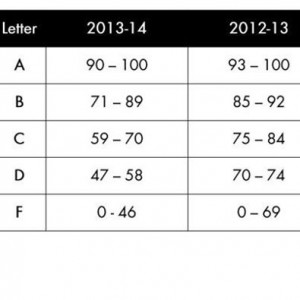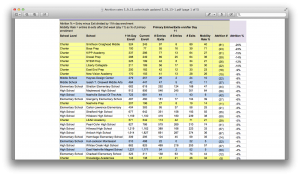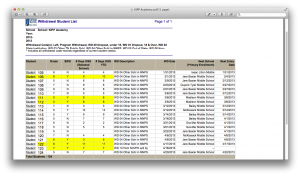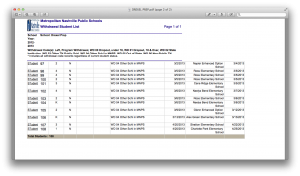Here is a look at the schedule for the week ahead. Bills are starting to trickle into committees. Remember that the bill filing deadline in Feb. 14.
Tuesday – 02/12/13 – 12:00pm – LP 16 – House Education Committee
There are no bills on notice in House Education. There will be presentations from the following people:
Tennessee Charter Schools Association, Matt Throckmorton, Executive Director
The Friedman Foundation for Educational Choice, Robert C. Enlow, President
CEO Putnam County Schools Virtual Learning Center, Jerry Boyd, Director of Schools, Sam Brooks, Virtual Learning Coordinator, Dr. Sharon Anderson, 7-12 Curriculum Supervisor
Tuesday – 02/12/13 – 3:00pm – LP 30 – House Education Subcommittee.
The subcommittee will take up nine bills.
1.HB702 M. White
Extends from 10 days to 20 days the time for appeal from a decision denying an application from the LEA to the state board of education..
2.HB839 T. Weaver
Age requirements for pre-K and Kindergarten. Changes the date that an at-risk child must be four years old by to enroll in prekindergarten programs. Allows children who have participated in private school prekindergarten programs and Head Start prekindergarten programs, in addition to LEA prekindergarten programs, to enter kindergarten in the 2013-2014 or 2014-2015 school years.
3.HB369 G. Johnson
Gives teachers who teach in multiple subject areas until July 1, 2014, to pass the content area tests in the subject areas in which they are teaching.
4.HB249 D. White
Allows special education teachers and alternative school teachers who teach in more than one subject area in which there is an end of course examination until July 1, 2014, to pass the content area tests in the subject areas in which they are teaching
5.HB151 G. McCormick (Administration bill)
Enrollment caps for virtual schools. Prohibits initial enrollment in a public virtual school from exceeding 1,500 students. Requires that students residing outside the LEA establishing the virtual school represent no more than twenty-five percent of the virtual school’s enrollment. Establishes that a public virtual school may exceed the total enrollment and out-of-district enrollment caps if the school demonstrates student achievement growth at a minimum level of “at expectations” as represented by the Tennessee Value-Added Assessment System. Prohibits the total enrollment from ever exceeding 5,000 students. Grants the commissioner the authority to reinstitute enrollment caps or direct the LEA to close the school when a public virtual school identified as a priority school demonstrates student growth at a level of “significantly below expectations.”
6.HB366 D. Hawk
Requires each center of regional excellence (CORE) and the LEAs it serves to establish a regional virtual school.
7.HB385 H. Love Jr.
Requires public virtual schools to meet the same class size requirements as regular public schools.
8.HB421 J. Pitts
Permits the commissioner of education to place any virtual school that fails to meet the performance standards set by the state board of education in the achievement school district.
9.HB728 M. Stewart
Terminates the Virtual Public Schools Act on June 30, 2013 rather than June 30, 2015 as is in current law.
Wednesday – 02/13/13 – 3:00pm – LP 12 – Senate Education Committee
Presentation:
CHAIR OF EXCELLENCE IN DYSLEXIC STUDIES
MR. JIM HERMAN AND MS. KATHERINE DAVIS MURFREE OF MTSU
The committee will take up eight bills:
1. SB8 by Summerville
Enacts the “Higher Education Equality Act” to prevent institutions of higher education from granting preferences based on race, gender or ethnicity to students, employees or contractors. –
2. SB19 by Tracy
Establishes an additional award, the STEM stipend, from net lottery proceeds for Tennessee HOPE scholarship recipients who are majoring in STEM fields; sets STEM stipend at $1,000 for the 2013-2014 academic year subject to appropriation and sufficient net lottery proceeds.
3. SB208 by Gresham
Enacts the “Military Education Assistance for Tennessee Act,” which provides eligibility for in state tuition to certain honorably dischargedveterans; creates tuition waiver program for members of the Tennessee state guard with at least one year of service and tuition discount program for the spouses of such members.
4. SB233 by Kelsey
As introduced, allows an LEA, in its discretion, to determine whether to continue employment of a nontenured teacher who taught in a school prior to the school’s transfer to the ASD.
5. SB531 by Dickerson
Includes the full ACT report of each LEA to the annual report published by the commissioner of education; requires the report to be published on the department of education web site.
6. SB532 by Dickerson
As introduced, changes the release date of the state report card from November 1 to October 1; revises the provisions governing the performances goals and assessments by requiring the department of education to provide raw test score data and teacher effect data to LEAs no later than May 1.
7. SB538 by Bell
Changes the definition of “homeschool student” for purposes of the Tennessee HOPE scholarship to require that a student be home schooled the last year of high school instead of the last two years of high school.
8. SB547 by Bell
Prohibits displaying messages supporting or opposing referenda and initiatives on LEA or school signs or LEA-owned buildings; prohibits video or audio messages supporting or opposing referenda and initiatives being sent via LEA or school telephonic or electronic systems or accounts.





